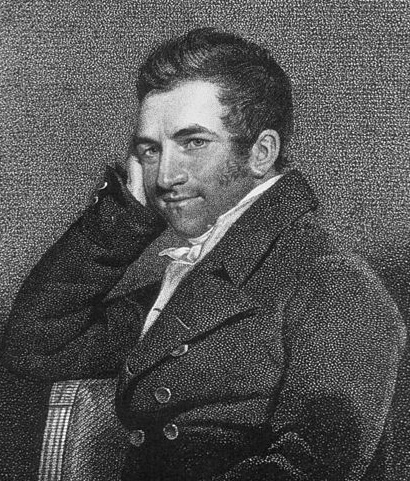| Profile | Major Works | Resources |
William Spence, 1783-1860
Yorkshire Entomologist, with a brief walk-on role in the history of economics. The young William Spence wrote his polemical Britain Independent of Commerce (1807) as a patriotic pamphlet to cheer British spirits during the French blockade of British trade - sufficiently successful with the public to merit four editions within a year.
The blockade, Spence sought to assert, was inconsequential largely because Britain's wealth rested ultimately on agriculture and not commerce. To defend his point, Spence resurrected the analysis of the Physiocrats, boldly declaring that agriculture is the source of all wealth. However, Spence adds the addendum that manufacturing can "assist" productivity of land, be he insists that it is itself a "sterile" sector (i.e. cannot produce a surplus). He uses Adam Smith's own arguments to "prove" that all taxes ultimately fall on land. After all, Smith had said that taxes on profits will be shifted to consumers, while the wages of labor always adjust in proportion to the price of necessities. However, while agreeing with the Physiocrats' tax-equivalence hypothesis (all taxes bear down on land rents), he stops short of advocating the "Single Tax".
Spence derives an underconsumptionist argument (which he immediately associates with the Earl of Lauderdale), that the expenditure of Landlords is of utmost necessity to ensure that general gluts do not emerge. "Parsimony", Spence argues, reduces "consumption" and thus the number of outlets for the profitable investment of capital, even while it increases the volume of capital in existence.
"It is clear, then, that expenditure, not parsimony, is the province of the class of land proprietors, and that it is on the due performance of this duty, by the class in question, that the production of national wealth depends. And not only does the production of national wealth depend upon the expenditure of the class of land proprietors, but, for the due increase of this wealth, and for the constantly progressive maintenance of the prosperity of the community, it is absolutely requisite, that this class should go on progressively increasing its expenditure." (Spence, 1807: p.32-33).
To this he adds resurrects a Mercantilist stance, applauding exports but calling to discourage foreign imports, because the primary consumers of imports are landowners and would thus be diverting their expenditures abroad.
Spence's pamphlet and thesis was favorably reviewed by William Cobbett in his Political Register in late 1807. Spence and Cobbett provoked replies from both James Mill (1808) and Robert Torrens (1808) and set the general glut controversy on track. Mill blasts Spence for his assertion that manufacturing does not produce a surplus and for failing to recognize simple balance of trade logic. But Mill's principal complaint is for Spence's ambiguous use of the term "consumption", in which he confounds consumption for gratification (what Mill calls "unproductive consumption") with the setting aside of capital for future production ("productive consumption" or "employment"). Parsimony, Mill argues, doesn't reduce "total consumption", but merely transfers expenditures from one kind of "consumption" to another. And, Mill asserts, the growth of a nation depends on the latter kind, not the former. With this, Mill goes on to state his version of Say's Law (i.e. "that a nation can never be naturally overstocked either with capital or commodities; as the very operation of capital makes a vent for its produce." (Mill, 1808)).
Spence replied with his Agriculture pamphlet, in which he starts out by distancing himself from the Physiocrats (whom Mill had lumped him with) and minimizing his own differences with Mill. But on the general glut, Spence stands his ground -- although it is not clear that he understood Mill's points. There is a hint of insight, when he seems to suggest that capital expenditures are different from regular consumption since the former simultaneously increase total supply (thus creating persistent overproduction), whereas the latter do not. But Spence messes the point up by stating that it is not so much "excessive" investment as a whole, but rather excessive investment in one sector (manufacturing) rather than another (agriculture), that is the problem.
Spence returned to economics in 1815 during the Corn Law debates, in order to defend them. He goes on about how the recent high price of corn encouraged increased investment into agriculture and should be maintained for England's prosperity.
|
Major Works of William Spence
|
|
HET
|
|
Resources on William Spence
|
All rights reserved, Gonšalo L. Fonseca

